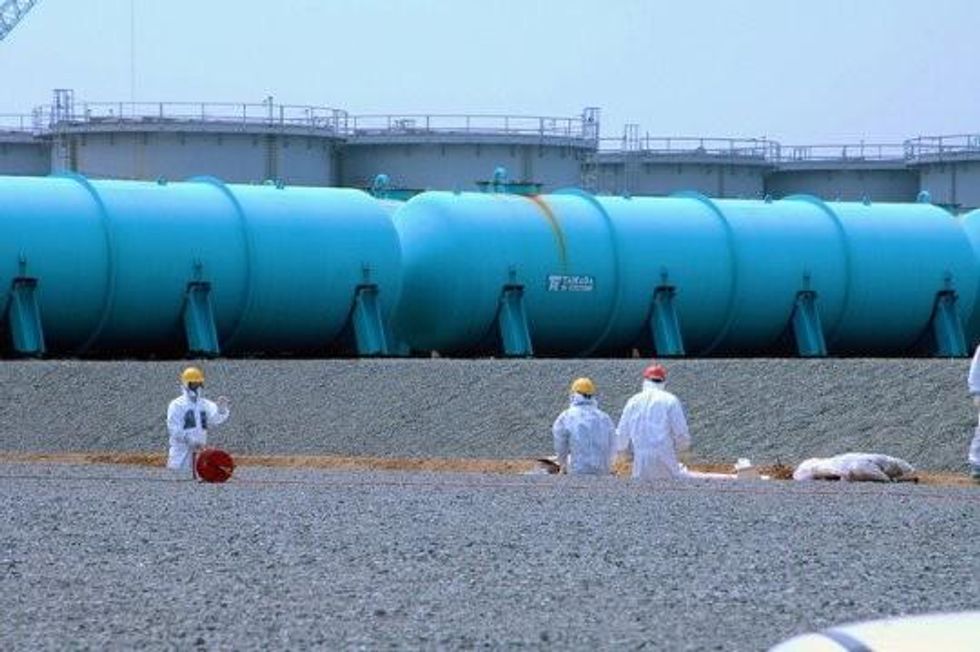

SUBSCRIBE TO OUR FREE NEWSLETTER
Daily news & progressive opinion—funded by the people, not the corporations—delivered straight to your inbox.
5
#000000
#FFFFFF
To donate by check, phone, or other method, see our More Ways to Give page.


Daily news & progressive opinion—funded by the people, not the corporations—delivered straight to your inbox.

According to TEPCO, the Advanced Liquid Processing System (ALPS) -- designed to decontaminate the water used to cool melted reactors -- was turned off after leaks were discovered by workers Monday night, Al Jazeera America reports.
At the time of the suspension, the cleaning system had just been restarted after being shut down for nearly a week, due to a glitch, Jiji news network reports. Just one example of the highly-criticized clean-up operation, this system has worked inconsisently since operations began a year ago, AFP reports.
The latest shutdown is a major blow to TEPCO's stated strategy, which "regards ALPS as a key facility to deal with contaminated water at the plant," according to Jiji.
The incident comes as the facility continues to produce huge volumes of radioactive water, with 436,000 cubic meters of contaminated water currently being stored in approximately 1,200 tanks -- an amount that is constantly growing, according to AFP.
_____________________
Dear Common Dreams reader, The U.S. is on a fast track to authoritarianism like nothing I've ever seen. Meanwhile, corporate news outlets are utterly capitulating to Trump, twisting their coverage to avoid drawing his ire while lining up to stuff cash in his pockets. That's why I believe that Common Dreams is doing the best and most consequential reporting that we've ever done. Our small but mighty team is a progressive reporting powerhouse, covering the news every day that the corporate media never will. Our mission has always been simple: To inform. To inspire. And to ignite change for the common good. Now here's the key piece that I want all our readers to understand: None of this would be possible without your financial support. That's not just some fundraising cliche. It's the absolute and literal truth. We don't accept corporate advertising and never will. We don't have a paywall because we don't think people should be blocked from critical news based on their ability to pay. Everything we do is funded by the donations of readers like you. Will you donate now to help power the nonprofit, independent reporting of Common Dreams? Thank you for being a vital member of our community. Together, we can keep independent journalism alive when it’s needed most. - Craig Brown, Co-founder |

According to TEPCO, the Advanced Liquid Processing System (ALPS) -- designed to decontaminate the water used to cool melted reactors -- was turned off after leaks were discovered by workers Monday night, Al Jazeera America reports.
At the time of the suspension, the cleaning system had just been restarted after being shut down for nearly a week, due to a glitch, Jiji news network reports. Just one example of the highly-criticized clean-up operation, this system has worked inconsisently since operations began a year ago, AFP reports.
The latest shutdown is a major blow to TEPCO's stated strategy, which "regards ALPS as a key facility to deal with contaminated water at the plant," according to Jiji.
The incident comes as the facility continues to produce huge volumes of radioactive water, with 436,000 cubic meters of contaminated water currently being stored in approximately 1,200 tanks -- an amount that is constantly growing, according to AFP.
_____________________

According to TEPCO, the Advanced Liquid Processing System (ALPS) -- designed to decontaminate the water used to cool melted reactors -- was turned off after leaks were discovered by workers Monday night, Al Jazeera America reports.
At the time of the suspension, the cleaning system had just been restarted after being shut down for nearly a week, due to a glitch, Jiji news network reports. Just one example of the highly-criticized clean-up operation, this system has worked inconsisently since operations began a year ago, AFP reports.
The latest shutdown is a major blow to TEPCO's stated strategy, which "regards ALPS as a key facility to deal with contaminated water at the plant," according to Jiji.
The incident comes as the facility continues to produce huge volumes of radioactive water, with 436,000 cubic meters of contaminated water currently being stored in approximately 1,200 tanks -- an amount that is constantly growing, according to AFP.
_____________________